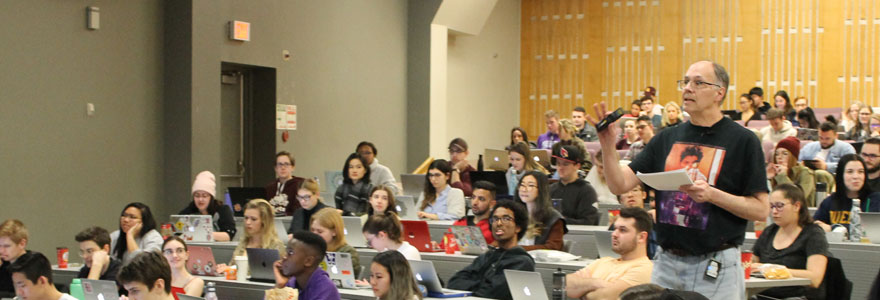News and Updates
Contact
Faculty of Social Science
Social Science Centre
Room 9438
Western University
T. 519-661-2053
F. 519-661-3868
E. social-science@uwo.ca
Wartime Canada given new life through Strategic Priorities Fund grant
January 12, 2022
Jonathan Vance, professor in the Department of History, teaches a class. Vance is a co-director of the Wartime Canada project. (photo and story by Rob Rombouts)
A grant from Western’s Strategic Priorities Fund will give new life to Wartime Canada, an important digital resource of historic documents.
Wartime Canada was originally launched in 2012, to highlight the experience of Canadians during the first and second world war, by digitizing documents related to daily life. This includes posters, leaflets, and booklets, but also includes items such as cookbooks and sheet music. The project gave new life to these documents and made the materials more widely available.
The project co-directors are Jonathan Vance, professor in the Department of History, and Graham Broad, associate professor in King’s Department of History.
“The original materials had been gathered by me and Graham, so we thought of how we could make the collections useful beyond just sitting in our offices,” said Vance.
The original site was built with the support of the SSHRC knowledge dissemination grant. An additional donation of $125,000 from Ley Smith helped build the original collection. They also receive donations of materials from personal collections. Materials on the site are free to use, and Vance said they hear from people from around the world who have accessed and used the materials in research projects, documentaries and other medium.
While the site was intended to make materials more readily available, technical issues risked the future of the project. Since launch, the platform the site was designed on was retired. This limited the site capabilities, preventing new materials from being uploaded, and eventually presented a risk that the entire site would stop working.
“The thought of it disappearing was hard to take,” said Vance. “The grant is perfectly timed as it’s the sort of life-belt we needed tossed to us. It’s a chance to rebuild the website and finish some of the things we couldn’t finish initially.”
The project will provide professional opportunities for graduate students, including students from the Department of French Studies, who will assist with translating materials across the site.
They also intend to expand the educational component of the site, working with Rachel Heydon, professor in the Faculty of Education, to make resources available for teachers.
“We had intended to have lesson plans for teachers to use on a plug-and-play basis,” said Vance. “We are going to get back into that and expand it, so they are useful for teachers within each province.”
Vance estimates that material on the site represents about ten per cent of what they currently have. Other materials have been digitized and are ready to load, and the new funding will help achieve this.
Among the items Vance is most excited to make available are school exercise books kept by students in grade three to six, during the first and second world war.
“There’s a lot of resources that tell us what adults think kids were thinking, but a primary source that shows us what they are thinking, you don’t get that,” said Vance. “This is a way to get directly from children’s mouths how they make sense of the war and how they deal with it as it happens.”
In the end, the funding will ensure all the materials are available for teachers, researchers, and the general public.
“So many historic documents are stored on mediums that are almost unrecoverable,” said Vance. “If we can continue to renew the site on an ongoing basis and not get into recovery mode, it will help to continue to make these resources available.”

